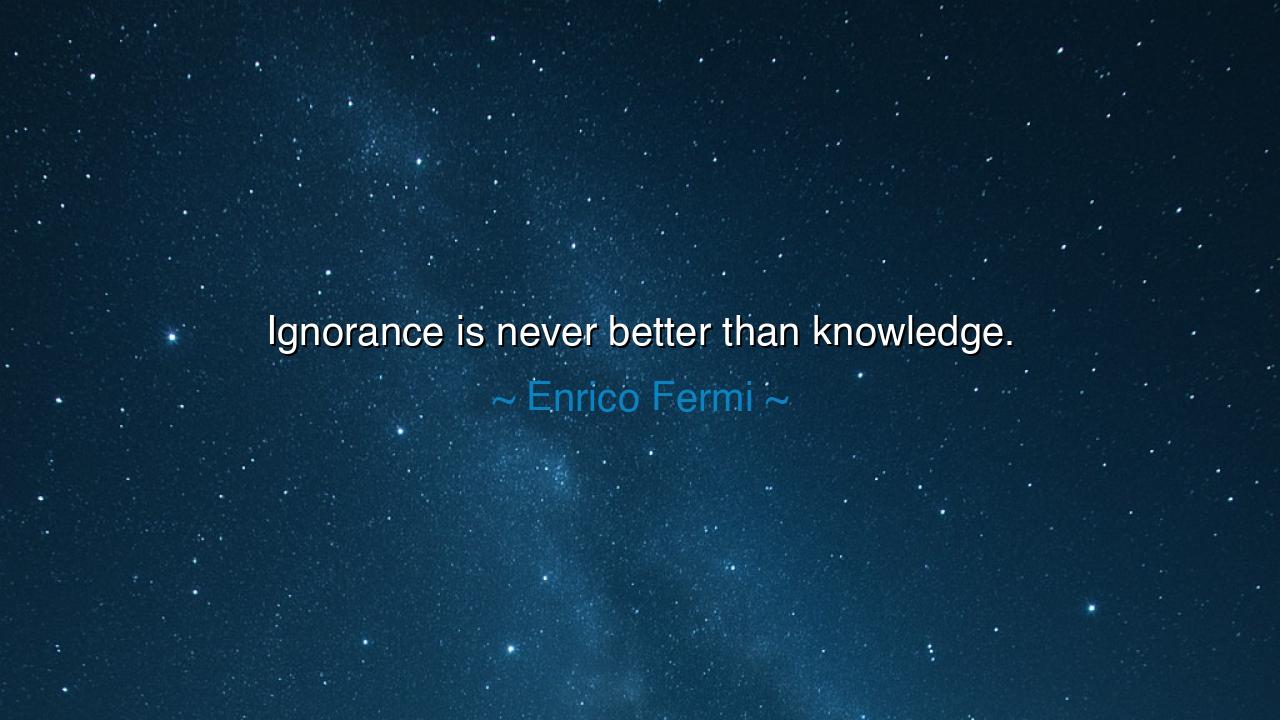
Ignorance is never better than knowledge.






Hear the steadfast words of Enrico Fermi, the great physicist of the twentieth century: “Ignorance is never better than knowledge.” In these few words lies a truth that cuts through all excuses, all complacency, all fear. For there are those who say, “Better not to know, better to remain in darkness, for truth may trouble the heart.” But Fermi, who lived in the very age when mankind unlocked the secrets of the atom, declares boldly that light is always better than shadow, and that knowledge, though it may bring burden, is never a curse, but a gift.
The ancients knew this long before Fermi spoke. Did not Prometheus steal fire from the gods, knowing well the punishment that awaited him? Yet he judged that the flame of understanding was worth more than the safety of ignorance. Did not Socrates, in Athens, drink the hemlock rather than renounce the pursuit of truth? He, too, believed that it was better to know and perish than to live in darkness. Across ages, the heroes of wisdom have always chosen knowledge over comfort, for to live without truth is to live half-alive.
Fermi himself witnessed the double edge of discovery. As one of the creators of the first nuclear reactor, he understood that knowledge could both illuminate and destroy. He saw how the unlocking of the atom brought both energy for cities and weapons of terrible power. Yet even then he proclaimed that ignorance was never the answer. To turn away from truth would not protect humanity, but leave it vulnerable, unprepared, and at the mercy of chance. Only through knowledge could humanity hope to control, to direct, and to guide its own destiny.
Consider the story of medicine. For centuries, diseases ravaged mankind. The ignorance of germs left millions helpless before plagues. Superstitions blamed spirits, curses, or divine wrath. But when Pasteur and Koch uncovered the truth of microbes, when knowledge replaced myth, the world gained the power to heal, to prevent, to save. Would it have been better to remain in ignorance, spared the discomfort of facing invisible enemies? No. For knowledge, though it unsettled, gave humanity weapons of life, while ignorance had only delivered death.
So too in everyday life. The child who fears the dark may comfort himself by refusing to look, but the darkness still hides what he does not see. The adult who hides from truth—be it about himself, his health, or his world—may find temporary ease, but in the end he pays dearly. To know the truth, however painful, is always the first step toward healing, toward action, toward freedom. For ignorance chains, but knowledge liberates.
The lesson for us is clear: never choose blindness over sight. When faced with truth, even if it unsettles you, embrace it, for it gives you the strength to act. Do not fear learning, even if it shows you danger, even if it reveals error. Knowledge equips you with tools, while ignorance leaves you empty-handed. The burden of truth is lighter than the chains of blindness.
What then must you do? Seek out truth with courage. Study, observe, and question. Do not shrink from knowledge because it disturbs your peace, but let it disturb you into growth. Teach others that to know is always better than not to know, even when knowledge is heavy. And above all, live by the principle that truth, however fierce, is the only soil in which freedom and progress can grow.
Thus remember Enrico Fermi’s words: “Ignorance is never better than knowledge.” Etch them upon your heart. For in all things—whether in science, in life, or in the soul—darkness is never safer than light, and blindness is never better than sight. Seek truth, and though it may test you, it will also set you free.






AAdministratorAdministrator
Welcome, honored guests. Please leave a comment, we will respond soon